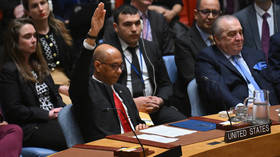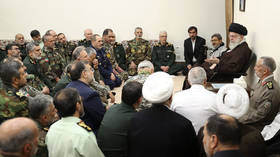The Middle East crisis has made one thing clear about the US
The veto on Palestinian statehood and Israeli strikes on Iran are signs of irreversible decline in American soft power

So-called Western values, especially those touted by the United States, have long revealed themselves to be hollow and contradictory. The country’s Declaration of Independence from Great Britain famously stated that “all men are created equal,” while instituting brutal chattel slavery on Africans and committing a horrific genocide against the Native people of the Americas.
Yet, it could still be argued – in terms however trite – that the US was somehow on the right side of history at various junctures. Today, recent actions by the administration have shown that this is undeniably no longer the case. On Thursday, the US vetoed a draft UN Security Council resolution that would grant Palestine full UN membership despite Washington’s official position being in favor of the two-state solution.
The US explained this decision by saying that Washington “continues to strongly support a two-state solution,” and that the “vote does not reflect opposition to Palestinian statehood but instead is an acknowledgment that it will only come from direct negotiations between the parties [who are currently at war].“ Most Arab countries, as well as major powers like Russia, have expressed dismay over the decision.
Trita Parsi, founder of the National Iranian American Council and co-founder and executive vice president of the Quincy Institute for Responsible Statecraft, said Washington had apparently lobbied its allies, Ecuador, Japan, and South Korea, so that the Biden administration would not have to veto the resolution. The states did not follow these orders. Washington failed to use its diplomatic weight to accomplish its face-saving goal before the UNSC, exposing its gradual loss of soft power.
Parsi also claims to have heard from a Western-friendly “senior Global South diplomat” that “whatever agonizing claim the US had to lead a self-appointed free world has died a very loud public death on the Security Council horseshoe tonight. You can't lead if you can't listen.”
Indeed, the fact that the US has issued four vetoes on behalf of Israel over the past seven months despite both international and domestic public opinion clearly supporting an immediate ceasefire in Gaza and the recognition of Palestinian statehood is remarkable. It shows that US leadership has been very publicly lambasted; additionally, it is clear that US “ironclad support” for Israel will not survive into the next generation because of the dismal state of public opinion, even just in the US itself.
Also on Thursday, Israel launched strikes on Iran following Tehran’s retaliatory attack during the preceding week. That was done in response to Israel bombing the Iranian consulate building in Damascus earlier this month, killing several high-ranking Iranian military officials. Despite President Joe Biden working double time all week to avoid Israel escalating regional tensions and the fact that the administration had advance notice of Israel’s attacks, his government failed to prevent it.
Additionally, Israel is reported to have also bombed Baghdad, Iraq against alleged members of the Islamic Revolutionary Guard Corps (IRGC) while the prime minister of Iraq is in Washington for a state visit. There are also unconfirmed reports, based on publicly available flight data, that an American military aerial refueling tanker aircraft was in western Iraq during the time of Israel’s attacks that day. It raises serious questions about whether Washington’s posture, stated as only helping Israel defensively, has quietly changed.
Now, the Middle East is closer to a regional war than ever as a result of failed American so-called leadership, and the contradictions between Washington’s words and deeds are mounting. Israel is reportedly demanding an expansion of its ground operation in Gaza to Rafah, the last holdout for Palestinians in the enclave, in exchange for not escalating toward a regional war. The chances of strategic miscalculations, given the number of actors, are immense.
Yet, from the Iranian standpoint, it appears Tehran, whose attacks on Israel last week were largely performative, is playing down the attacks on its soil. This may provide a clear exit from the escalatory cycle – which would be consistent with the behavior of the current Iranian state over decades – if, indeed, the matter of the Damascus consulate bombing is “closed,” as official Iranian sources said. A massive win for both regional and global security, this would also reveal Iran, which the West defines as a “rogue state,” as evidently more responsible and forward-looking than the so-called world leader, the US.
No matter how the situation in the Middle East unfolds, it is clear, once again, that American leadership has been abdicated. The wider global community is discussing the issue in Gaza at length to reach a pragmatic and attainable solution. Meanwhile, Washington refuses to listen to these pleas, will not hold the government of Israeli Prime Minister Benjamin Netanyahu accountable for its actions, and cannot formulate a coherent strategy that aligns with its own stated values.
The statements, views and opinions expressed in this column are solely those of the author and do not necessarily represent those of RT.
https://www.rt.com/news/596413-us-israel-palestine-veto-iran/




0 Comments:
Post a Comment
Subscribe to Post Comments [Atom]
<< Home